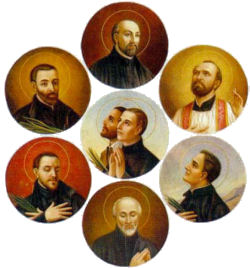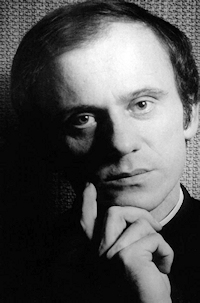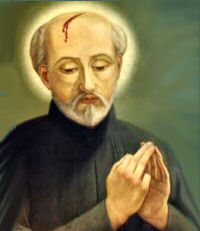Ordinary Time: October 19th
Memorial of Sts. John de Brebeuf and Isaac Jogues, Priests and Companions, Martyrs (US); Bl. George (Jerzy) Popieluszko
Other Commemorations: Bl. George (Jerzy) Popieluszko, Priest and Martyr (RM)
» Enjoy our Liturgical Seasons series of e-books!
Today in the dioceses of the United States the Church celebrates the optional memorial of Sts. Issac Jogues and John de Brébeuf (priests and martyrs) and their companions (martyrs). They were Jesuit missionaries who died as martyrs in North America where they preached the Gospel.
According to the 1962 Missal of St. John XXIII the Extraordinary Form of the Roman Rite, today is the feast of St. Peter of Alcantara, priest. He was one of St. Teresa's spiritual directors and encouraged her in her reformation of the Carmelite Order.
St. Isaac Jogues, St. Jean de Brébeuf and Companions
 Father Isaac Jogues, Apostle of the Iroquois
Father Isaac Jogues, Apostle of the Iroquois
Father Jean de Brébeuf, Apostle of the Hurons
Father Gabriel Lalemant
Father Noel Chabanel
Father Charles Garnier
Father Anthony Daniel
René Goupil
Jean de Lalande
French Jesuits were the first missionaries to go to Canada and North America after J. Cartier discovered Canada in 1534. Their mission region extended from Nova Scotia to Maryland. Isaac Jogues, John de Brébeuf, Gabriel Lalemant, Noel Chabanel, Charles Garnier, Anthony Daniel, René Goupil and John de Lalande (the first six Jesuits, the last two laymen) preached the gospel to the Iroquois and Huron Indians, and after being tortured, they were martyred in the area of what is now Auriesville, New York. The martyrdoms took place between 1642 and 1649. Ten years after the martyrdom of St. Isaac Jogues, Kateri Tekakwitha was born in the same village in which he died. These martyrs are co-patrons of Canada.
The missionaries arrived in Canada less than a century after its discovery by Cartier in 1534, in the hope of converting the Indians and setting up "New France." Their opponents were often the English and Dutch colonists. When Isaac Jogues returned to Paris after his first capture and torture, he said to his superior: "Yes, Father, I want whatever our Lord wants, even if it costs a thousand lives." He had written in his mission report: "These tortures are very great, but God is still greater, and immense."
In the Office of Readings we have an excerpt from the mission journal of St. John de Brébeuf, who had been a student of the great Jesuit spiritual writer, Louis Lallemant. He wrote:
For two days now I have experienced a great desire to be a martyr and to endure all the torments the martyrs suffered.... I vow to you, Jesus my Savior, that as far as I have the strength I will never fail to accept the grace of martyrdom, if some day you in your infinite mercy should offer it to me, your most unworthy servant.... On receiving the blow of death, I shall accept it from your hands with the fullest delight and joy of spirit.... My God, it grieves me greatly that you are not known, that in this savage wilderness all have not been converted to you, that sin has not been driven from it.
—Excerpted from Saints of the Roman Calendar by Enzo Lodi
Patronage: Americas; Canada.
Symbols and Representation: men dressed in Jesuit black robes with crucifix in hands; IHS is the symbol for the Society of Jesus; red (color for martyrdom); red roses (symbol of martyrdom);
Highlights and Things to Do:
- Pray to the Holy Spirit to renew the evangelization of distant countries as well as the re-evangelization of our own nation.
- More Christians have been martyred in the 20th century than in the previous nineteen centuries combined. For example, pastors are being arrested and sometimes shot in China and Cuba. Believers are forbidden to buy goods or own property in Somalia. Christians who testify to their faith in Iran or Saudi Arabia may be put to death for blasphemy. Mobs have wiped out whole villages of Christians in Pakistan. Pray for courageous and zealous missionaries in these countries where the Church is persecuted.
- Listen to the Catholic Culture podcast Episode 3: Native American Catholicism & the New Evangelization interview with journalist Peter Jesserer Smith.
- Read more about the North American Martyrs:
- Catholic Encyclopedia: St. Isaac Jogues
- Catholic Encyclopedia: Jean de Brébeuf
- Catholic Encyclopedia: Gabriel Lalemant
- Catholic Encyclopedia: Noel Chabanel
- Catholic Encyclopedia: Charles Garnier
- Catholic Encyclopedia: Anthony Daniel
- Catholic Encyclopedia: René Goupil
- Catholic Encyclopedia: Auriesville
- Catholic Ireland
- Domestic Church
- CatholicSaints.info
- Saints Stories for All Ages
- Support the Indian Missions in the USA.
- Visit the National Shrine of the North American Martyrs in Auriesville, New York. This site offers a wonderful gallery of pictures of the shrine.
- Learn more about each of the martyrs. You might also like to read this definitive scholarly biography, Saint Among Savages: The Life of St. Isaac Jogues, by Francis Talbot, S.J.
- Learn for Christmas the Huron Christmas Carol, the first American Christmas carol John de Brebeuf wrote to teach the Christmas story to the Huron Indians.
- Bake a Huron Indian Blueberry Crunch Cake for the feast day.
- St. Jean Brébeuf gave the name lacrosse to a game played at that time by Native Americans.
Bl. Jerzy Popieluszko
 Blessed Jerzy Popieluszko was born on September 14, 1947, on a farm in the small village of Okopy located in North Eastern Poland. His parents Wladyslaw and Mariana were devout Catholics and he was baptized Alphons Popieluszko two days after his birth. He was a fragile child but as his parents stated he made up for any physical infirmities in strength of character.
Blessed Jerzy Popieluszko was born on September 14, 1947, on a farm in the small village of Okopy located in North Eastern Poland. His parents Wladyslaw and Mariana were devout Catholics and he was baptized Alphons Popieluszko two days after his birth. He was a fragile child but as his parents stated he made up for any physical infirmities in strength of character.
The country into which Alphons was born was one suffering from the aftermath of the reign of terror by the Nazi’s and the ongoing persecution of the Church by the Communists since the country’s occupation by the Russians in the Second World War. Okopy, the geographical center or “heart” of Poland was a rural village and thus its school system was not as deeply infiltrated with the sociology of the communist regime, but nevertheless Alphons suffered for his Faith while yet in school. Each morning before classes began Alphons would walk three miles to serve Mass, and then after classes were over in the evening, would return to the Church to pray the Rosary. His spirituality was ridiculed and he was accused by his teacher of praying too much.
As a precaution due to the harassment he received Alphons kept secret his intention to join the seminary for fear that if it were known the results of his exams would be altered. After graduating high school in 1965 while his friends were at the school ball, Alphons was on a train headed for the seminary in Warsaw. He had chosen Warsaw due to its closeness to the monastery of St. Maximilian Kolbe, one of his favorite saints. Although against the agreement of 1950 between the Church and State, after one year of seminary training Alphons was drafted into the military for a two year tour in a special unit for clerics in Bartoszyce.
The plan for drafting clerics into the service was to indoctrinate them with the communistic ideal and cause them to lose their vocation. In spite of bitter persecution ensuing from the practice of his Faith, Alphons firmly defied the authority’s attempt to marginalize Catholicism. On one occasion, when he refused to crush his rosary beneath his heel he was cruelly beaten and placed in solitary confinement for a month. Also on account of his refusal to remove a medal from about his neck he was forced to stand for hours in the freezing rain. He was also made to crawl around the camp on his hands and knees as a punishment for saying the rosary. The results of this barbarity were that on the completion of his two year tour, Alphons had to undergo a life threatening surgery to undo the damage done to his heart and kidneys from his beatings. The recovery caused his ordination to be delayed, but on May 28, 1972, he was ordained with his name changed from Alphons to Jerzy by Cardinal Wyszynski.
Father Jerzy Popieluszko was first stationed taking care of several small parishes where his work was greatly appreciated. In January of 1979 he collapsed while saying Mass, and was sent to stay in a hospital to recover. Afterwards, he was given the duty as chaplain for the medical university of St. Ann in Warsaw. A year later he was transferred to his last parish, St. Stanislaus Kostka in Warsaw.
When Solidarity met in the Lenin shipyard in the summer of 1980, Father Jerzy was the chaplain sent to the striking workers. The success of Solidarity helped to inspire Father Jerzy, and every month afterwards he would offer a Mass for the Homeland and give a sermon to inspire people to follow the maxims of the Gospel, primarily by abandoning violence. Father Jerzy also organized a relief effort to help the families suffering from the loss of their jobs and livelihood as a result of defending the Faith, or the government having declared martial law. The government grew more and more frustrated with Father Jerzy as more and more people flocked to him, and at the monthly Mass for the homeland had guards stationed at every block corner to watch him. Father Jerzy went out of his way to be kind to these guards, calling them his “Guardian Angels” and even bringing them coffee in the cold Polish winter.
On December 13, 1982, a bomb was left on Father Jerzy’s doorstep which would have killed him if he had answered the door. The next year, in August of 1983, the police opened a formal case against him and in December he was summoned to the prosecutor’s office. While detained, the police broke into his house to fill it with explosives and anti-government propaganda so they could have a cause to arrest him and launch a slur campaign.
While imprisoned with hardened criminals, Father Jerzy Popieluszko stayed up all night speaking with a murderer, and finally hearing the man’s confession. After being released from prison, Father Jerzy was interrogated 13 times between January and June of 1984. In September he was planning his annual pilgrimage to Jasna Gora when he received threats warning him, “If you go to Jasna Gora you are dead.”
On October 13, 1984, an attempt was made on his life by means of a staged car accident, though Father Jerzy was saved due to his excellent driving ability. On October 19, 1984, after offering Mass in Bydgoszcz, Father Jerzy left with his driver for the 161 mile return trip to Warsaw. Thirty minutes into the drive the car was flagged down by two uniformed men for a traffic check near the village of Tourn. The uniformed men were actually officers of the security service and, on asking Waldemar Chrostowski, the driver, to hand over the keys to the car, handcuffed him and forced him into the back seat of their vehicle at gunpoint. Father Jerzy was then grabbed and brutally beaten senseless with fists and clubs and thrown into the trunk of the car, which then sped off.
A few miles later Waldemar Chrostowski managed to escape the car and ran to the local Church to alert the authorities. Meanwhile, the two officers stopped the car to fasten down the trunk and gag Father Jerzy, who was shouting and had almost managed to pry open the trunk. Father Jerzy momentarily escaped them and ran into the woods, but was soon recaptured and beaten so savagely that his face and hands were unrecognizable. He was then driven to a reservoir on the Vistula River. Father Jerzy’s hands and feet were tied with a noose fastened around his neck so that if he straightened his legs it would suffocate him. His mouth was stuffed with cloth, blocking the airway, and his nose was closed with sticking plaster. Finally, having tied a bag of rocks to his feet, they threw him into the reservoir.
The body of Father Jerzy was not discovered until ten days had passed, and his funeral was held on November 2. An autopsy revealed that he may have still been alive when thrown into the reservoir.
The cause for his beatification began in 1997 and in 2008 Father Jerzy Popieluszko was elevated to the status of Servant of God. On December 19, 2009, Pope Benedict signed the decree recognizing the martyrdom of Father Jerzy Popieluzko. On August 6th, 2010, in the presence of his mother, who was over 100 years old, Father Jerzy was solemnly beatified.
The last public words spoke by Blessed Jerzy Popieluzko during the meditation on the rosary October 19, 1984, give a summary of his life and may serve as a guiding star in ours.
“In order to defeat evil with good, in order to preserve the dignity of man, one must not use violence. It is the person who has failed to win on the strength of his heart and his reason, who tries to win by force…Let us pray that we be free from fear and intimidation, but above all from the lusts for revenge and violence.”
*from a speech delivered by Martha Custis, October 20, 2011
—Excerpted from Roman Catholic Saints
Highlights and Things to Do:
- Purchase Blessed Jerzy Popieluszko: Truth versus Totalitarianism from Ignatius Press.
- Read more about Bl. Jerzy Popieluszko:
- Read Remembering a Young Martyr, Blessed Jerzy Popiełuszko.
- Read Polish priest, martyr and hero: Remembering Fr. Jerzy Popiełuszko.
- Watch The Messenger of the Truth, a full movie on YouTube.






